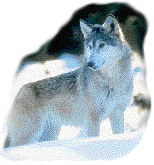

 The gray wolf used to live in most of the northern United States, including Colorado. In fairy tales, wolves can be pretty mean, but in real life, wolves are shy animals who are afraid of people. They are predators - that means they hunt other animals for food. But they don't kill just for fun. Their natural food was deer, elk and antelope. But as more people settled the country, they killed off many of these animals, so wolves started eating the cattle and sheep that the settlers brought with them. Because the settlers needed those cattle and sheep for their own families, and because many people were afraid of wolves, people started killing wolves until they became endangered. Many places would even offer money to anyone who would kill a wolf. The last wolf in Colorado was shot 50 years ago.
The gray wolf used to live in most of the northern United States, including Colorado. In fairy tales, wolves can be pretty mean, but in real life, wolves are shy animals who are afraid of people. They are predators - that means they hunt other animals for food. But they don't kill just for fun. Their natural food was deer, elk and antelope. But as more people settled the country, they killed off many of these animals, so wolves started eating the cattle and sheep that the settlers brought with them. Because the settlers needed those cattle and sheep for their own families, and because many people were afraid of wolves, people started killing wolves until they became endangered. Many places would even offer money to anyone who would kill a wolf. The last wolf in Colorado was shot 50 years ago.
Now, the U.S. Department of Fish and Wildlife would like to see wolves reintroduced into their natural homes. This is happening already in Minnesota, but not in Colorado yet. There are lots of deer and elk in the Colorado mountains for them to eat now. In fact, many people feel that having the wolves back would be a help to the deer and elk herds. Without enough natural enemies, the herds get too big, and some animals starve. Also, wolves and other predators usually catch the oldest or sickest deer, so maybe they could help keep the other deer from getting sick and dying, too. Some ranchers, though, are worried that the wolves will kill too many of their cattle. Will the wolves come after cattle if there are plenty of deer to eat? It's hard to know. In Minnesota, they offer ranchers money to pay for any animals that are known to have been killed by wolves. That way, the wolves have a chance, but the ranchers don't lose too much money.
On April 12, 1996, Governor Romer signed a bill that puts control of predators (like wolves) under the control of ranchers instead of the wildlife agencies. Some people who want to bring back wolves fear that that will make it harder.
If you want to find out more about how to help wolves come home, check out the Sinapu page. They have a schedule of meetings and slide shows where you can learn more about wolves and about all sides of this issue.
Last year, congress passed a law called the Timber Salvage Rider which allows the logging companies to take more trees. If part of the forest is threatened by fire, insects or disease, companies can cut trees there without following the normal rules about protecting the environment. Since the loggers were taking trees from "sick" parts of the forest, people hoped that it would not hurt anything.
Many environmentalists think that the Timber Salvage Rider was a mistake. They want to repeal it - that means remove the law. People disagree about what parts of a forest are in danger of fire or are too damaged. And some people feel that the loggers want to use the Timber Salvage Rider as a way to get access to more of the older parts of the forest, including some in Colorado. A bill has been introduced into Congress to repeal the Timber Salvage Rider. If this bill passes, all logging would have to be done according to the guidelines of the environmental laws protecting endangered species and clean air and water.
The bill to repeal the Timber Salvage Rider is H.R. 2745. If you would like to learn more about this bill, or write to your representative in Congress, ask your parents to look at our Contacts page. The National Wildlife Federation page can give your more information.



